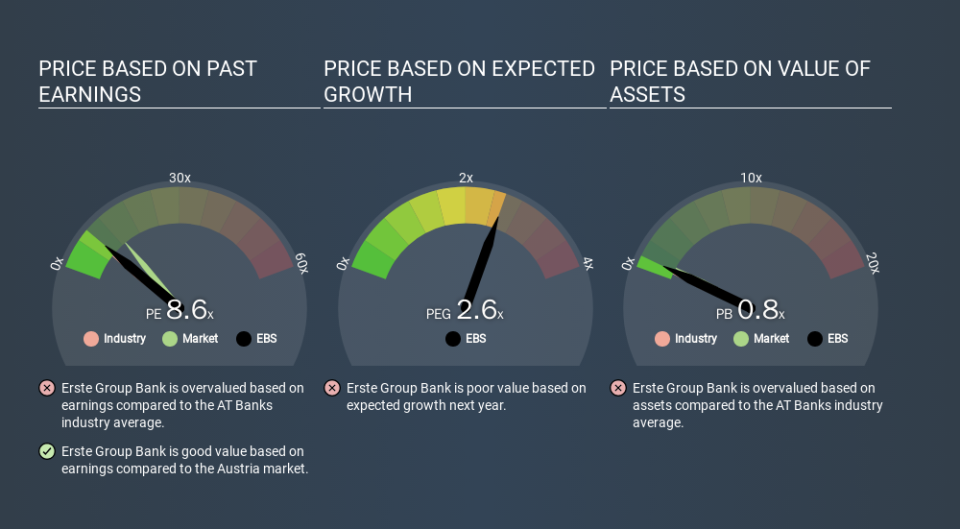Don't Sell Erste Group Bank AG (VIE:EBS) Before You Read This

Today, we'll introduce the concept of the P/E ratio for those who are learning about investing. We'll look at Erste Group Bank AG's (VIE:EBS) P/E ratio and reflect on what it tells us about the company's share price. Looking at earnings over the last twelve months, Erste Group Bank has a P/E ratio of 8.62. That is equivalent to an earnings yield of about 11.6%.
See our latest analysis for Erste Group Bank
How Do I Calculate Erste Group Bank's Price To Earnings Ratio?
The formula for P/E is:
Price to Earnings Ratio = Price per Share ÷ Earnings per Share (EPS)
Or for Erste Group Bank:
P/E of 8.62 = EUR31.03 ÷ EUR3.60 (Based on the trailing twelve months to December 2019.)
Is A High Price-to-Earnings Ratio Good?
The higher the P/E ratio, the higher the price tag of a business, relative to its trailing earnings. That is not a good or a bad thing per se, but a high P/E does imply buyers are optimistic about the future.
How Does Erste Group Bank's P/E Ratio Compare To Its Peers?
We can get an indication of market expectations by looking at the P/E ratio. As you can see below Erste Group Bank has a P/E ratio that is fairly close for the average for the banks industry, which is 8.1.
Erste Group Bank's P/E tells us that market participants think its prospects are roughly in line with its industry. So if Erste Group Bank actually outperforms its peers going forward, that should be a positive for the share price. I would further inform my view by checking insider buying and selling., among other things.
How Growth Rates Impact P/E Ratios
Earnings growth rates have a big influence on P/E ratios. If earnings are growing quickly, then the 'E' in the equation will increase faster than it would otherwise. And in that case, the P/E ratio itself will drop rather quickly. So while a stock may look expensive based on past earnings, it could be cheap based on future earnings.
Erste Group Bank's earnings per share fell by 10% in the last twelve months. But over the longer term (3 years), earnings per share have increased by 7.2%.
Remember: P/E Ratios Don't Consider The Balance Sheet
The 'Price' in P/E reflects the market capitalization of the company. Thus, the metric does not reflect cash or debt held by the company. Theoretically, a business can improve its earnings (and produce a lower P/E in the future) by investing in growth. That means taking on debt (or spending its cash).
Such expenditure might be good or bad, in the long term, but the point here is that the balance sheet is not reflected by this ratio.
Is Debt Impacting Erste Group Bank's P/E?
Erste Group Bank's net debt is considerable, at 127% of its market cap. If you want to compare its P/E ratio to other companies, you must keep in mind that these debt levels would usually warrant a relatively low P/E.
The Bottom Line On Erste Group Bank's P/E Ratio
Erste Group Bank has a P/E of 8.6. That's below the average in the AT market, which is 13.0. Given meaningful debt, and a lack of recent growth, the market looks to be extrapolating this recent performance; reflecting low expectations for the future.
When the market is wrong about a stock, it gives savvy investors an opportunity. If it is underestimating a company, investors can make money by buying and holding the shares until the market corrects itself. So this free visual report on analyst forecasts could hold the key to an excellent investment decision.
You might be able to find a better buy than Erste Group Bank. If you want a selection of possible winners, check out this free list of interesting companies that trade on a P/E below 20 (but have proven they can grow earnings).
If you spot an error that warrants correction, please contact the editor at editorial-team@simplywallst.com. This article by Simply Wall St is general in nature. It does not constitute a recommendation to buy or sell any stock, and does not take account of your objectives, or your financial situation. Simply Wall St has no position in the stocks mentioned.
We aim to bring you long-term focused research analysis driven by fundamental data. Note that our analysis may not factor in the latest price-sensitive company announcements or qualitative material. Thank you for reading.

